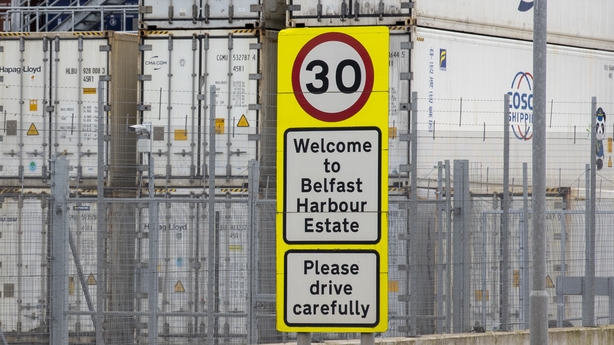Even with six and a half hours of sometimes spiky exchanges at Stormont, there was never any doubt about the outcome.
They voted 48 to 36 to continue the special post-Brexit trading arrangements that apply to Northern Ireland.
The vote required only a simple majority, 50% plus one of those in the chamber.
The formal name for these trading arrangements is the Northern Ireland Protocol.
In Belfast, people like to say what they see, so up north it's known colloquially as The Irish Sea Border.
Unionists, who vehemently oppose it and voted unanimously against the Stormont motion for continuation, were outvoted by Sinn Féin, Alliance and the SDLP.
On the face of it, that should be that for another four years until the question of renewal comes up again.
However, it raised questions about unionist faith in the fragile political institutions in Northern Ireland, recently re-established after years of collapse.
On paper, the post-Brexit trading arrangements are a set of checks and paperwork which address a practical problem.
Two states on the island of Ireland, one in the EU Single Market and one in the UK market presented a quandary.
How could you monitor the flow of goods across a three-hundred-mile porous border?

How could you prevent items which were not produced to an EU standard making their way into the Republic and on into the wider single market without checks at that border and the jeopardy that might pose to the peace process?
After years of wrestling with that conundrum, the authorities arrived at a simple answer.
You couldn't.
So, if there had to be checks somewhere, the option was to put them where they were easier to manage and less visible.
The Irish Sea or more particularly the ferry routes from Britain to Northern Ireland, became the solution.
In the simplest terms, there’s now a green lane and a red lane for goods coming into Belfast and other ports.
Green lane goods are for consumption in Northern Ireland and have limited checks. Red lane goods are headed for the Republic and are subject to more stringent scrutiny.
EU law continues to apply in around 300 areas. The EU customs code also applies.
Unionists hate all this. They cite economic impacts on the UK internal market, some small firms in Great Britain refusing to ship to Northern Ireland due to additional complexity and cost.
But at its heart, this is a constitutional issue for them. They feel the new regime drives a wedge between Northern Ireland and the rest of the UK and favours an all-island economy that many of them fear will be a driver in a future unity vote.
That's why so many of them took the opportunity to contribute to the debate on Tuesday, and why it lasted for six and a half hours, even though the outcome was inevitable.
For the DUP, Emma Little-Pengelly, Stormont's Deputy First Minister, was scathing of the Tories who she blamed for mishandling Brexit.
Former prime minister Theresa May had been inept, then there'd been the "blundering" of Boris Johnston
The whole thing had been a "catalogue of mistakes, errors and own goals" - project Brexit had been "botched".
Ms Little-Pengelly's opponents weren’t having that.
Alliance leader Naomi Long intervened to point out that the DUP had supported Brexit, backed Boris Johnston when he ran as prime minister and cosied up to him afterwards.
Much unionist ire was reserved for the mechanism of Tuesday's vote.
Some decisions at Stormont can be called in under a process known as a petition of concern.
It means they must get cross-community support - the backing of both unionist and nationalist blocs - rather than passed by a simple majority.
It's part of what has been described as part of the "ugly scaffolding" which shores up consensus politics at Stormont.
Tuesday's vote did not need it.
Unionists called foul. The vote had been "rigged", the outcome predetermined.
Those lined up against them pushed back.

There'd been no cross-community support for Brexit and the DUP had championed the UK-wide implementation of the decision to leave, even though Northern Ireland had voted to remain.
The voting mechanism had been agreed in a binding international agreement, ratified at Westminster and it covered an area, trade, which is not a devolved competency.
From outside the chamber came dire warnings of the consequences of the result for the political institutions.
There were calls from the Twitterati for unionism to walk away.
In the chamber, the contributions were more measured.
Former DUP first minister Paul Givan said it was a sad day, but people shouldn't talk themselves into a downward spiral of despair.
He said opposition to the new trading arrangements would not be remedied by damaging the political institutions and alternative options being offered would not remove the protocol.
"That is the fundamental weakness in the argument of those who would burn this House down, with no credible path to rebuilding support for the union," he said.
New facilities are under construction at Larne Port to carry out Irish Sea Border checks.
It’s a physical manifestation of the new arrangements that unionists despise.
But the trading arrangements are here to stay, and its opponents look to have few options but to accept it.







